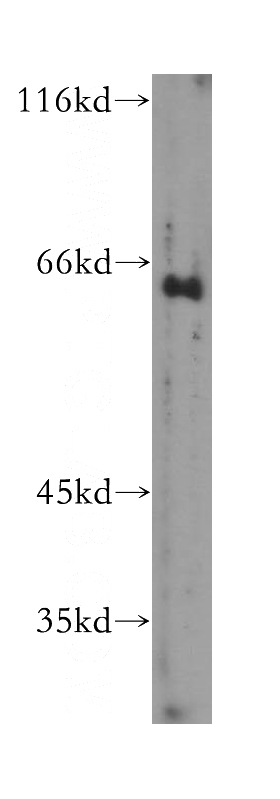-
Product Name
GTF2H1 antibody
- Documents
-
Description
GTF2H1 Rabbit Polyclonal antibody. Positive WB detected in human brain tissue. Observed molecular weight by Western-blot: 62kd
-
Tested applications
ELISA, WB
-
Species reactivity
human, mouse; other species not tested.
-
Alternative names
GTF2H1 antibody; TFIIH antibody; BTF2 antibody; BTF2 p62 antibody; TFB1 antibody
-
Isotype
Rabbit IgG
-
Preparation
This antibody was obtained by immunization of GTF2H1 recombinant protein (Accession Number: NM_005316). Purification method: Antigen affinity purified.
-
Clonality
Polyclonal
-
Formulation
PBS with 0.1% sodium azide and 50% glycerol pH 7.3.
-
Storage instructions
Store at -20℃. DO NOT ALIQUOT
-
Applications
Recommended Dilution:
WB: 1:200-1:1000
-
Validations

human brain tissue were subjected to SDS PAGE followed by western blot with Catalog No:111232(GTF2H1 antibody) at dilution of 1:200
-
Background
TFIIH is a multiprotein complex that has a central role in the RNA pol II mediated transcription, in DNA repair and in the control of the cell cycle. TFIIH consists of nine subunits: cyclin-dependent kinase 7 (Cdk7), cyclin H and MAT1 (forming the Cdk-activating-kinase or CAK complex), the two helicases Xpb/Hay and Xpd, and p34, p44, p52 and p62. As the kinase subunit of TFIIH, Cdk7 participates in basal transcription by phosphorylating the carboxy-terminal domain of the largest subunit of RNA polymerase II. Mutations in some components of TFIIH are associated with three hereditary human syndromes: xeroderma pigmentosum (XP), Cockayne syndrome (CS) and trichothiodystrophy (TTD). The p62 protein (TFIIH1) is a structural component of the TFIIH core and no syndromes have been identified up to date by mutations in this human gene.
Related Products / Services
Please note: All products are "FOR RESEARCH USE ONLY AND ARE NOT INTENDED FOR DIAGNOSTIC OR THERAPEUTIC USE"
